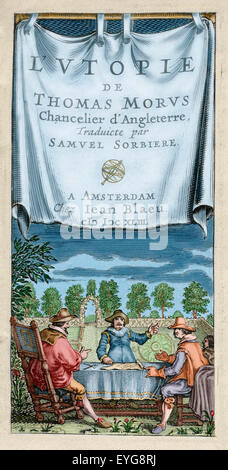

For instance, in historian J.H Hexter’s book About Utopia, Hexter argues that “More wanted his readers to take seriously the community of life and property that he ascribed to the commonwealth of the Utopians”(1), while David M Bevington argues that More created two personas to say different sides of the usefulness of Utopia as a state and how Utopia can be a blueprint for a nation.(2) Bevington argues that the character Raphael Hythloday’s “platform is the common ownership of property and specifies that Hythloday refuses to concede the feasibility of gradual reform”.(3), and More’s persona argues in favour of gradual changes within practical politics.(4) The two arguments from Hexter and Bevington comment upon the topic of Tudor society. Furthermore, More’s reason for publishing Utopia has been theorized by numerous historians. Regarding the monograph's time of completion, More published the book in 1516. More is widely known for his refusal to take the Oath of Supremacy, the oath that made the King the supreme head of the church, and this had More summarily executed for treason as More was a devote Catholic. More was an important statesman, lawyer, and humanist under the rule of King Henry VIII. The monographs author is Sir Thomas More. The book Utopia, otherwise known as “a little, true book, not less beneficial than enjoyable, about how things should be in a state and about the new island Utopia”, is a monograph which is a work of fiction and a socio-political satire.


 0 kommentar(er)
0 kommentar(er)
